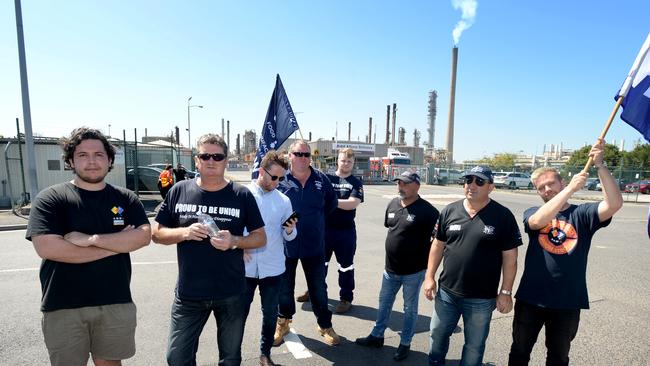Altona ‘latest blow to the nation’s refinery industry’
Australia could be left with only one operating refinery unless the Morrison government is prepared to boost its industry rescue package.

Australia could be left with only one operating refinery unless the Morrison government is prepared to boost its industry rescue package after ExxonMobil’s decision to shut down its Altona facility in Melbourne sparked fears of a bigger rout in manufacturing jobs.
Exxon confirmed that Altona would close after nearly 75 years of operation, with up to 300 jobs in peril — the latest blow to the nation’s refinery industry and a decision that has sparked fears Ampol may also shutter its Lytton plant in Brisbane given tough industry conditions.
The government’s fuel subsidy offer may need to be expanded or Lytton may suffer the same fate, MST Marquee analyst Mark Samter said, given the package was not enough for Exxon to keep Altona alive.
“One can only logically assume that, given they rejected the short-term support from the government, what was on the table for the initial support was grossly insufficient to justify them keeping it open,” Mr Samter told The Australian. “In my mind either the government changes its level of support materially, or Lytton is going too.”
Energy Minister Angus Taylor said it was “extremely disappointing” Exxon had made its decision after the government had created a $2bn subsidy package designed to ensure the nation’s three remaining refineries stayed open.
It follows a decision by British energy giant BP in October to close its Kwinana refinery in Western Australia, putting 600 workers out of a job. Viva Energy announced plans in December to take up the interim subsidy to help safeguard the short-term future of its Geelong refinery in Victoria.
But Ampol is still considering the future of Lytton and said in December it was open to shutting it down and switching to an import facility — as Exxon plans to do with Altona — or continue operating the plant as it works out what best meets buyers’ needs.
One factor that could play in Ampol’s favour was an expectation it may now be able to draw more of the production payment continued in the government’s rescue package given Exxon’s decision, sources said.
Exxon’s decision could also lead to further job cuts among manufacturers that rely on the plant for fuel supplies.
Australia’s largest plastics producer, Qenos, which relies on Altona for fuel supplies, said it was studying the implications of the energy major’s decision to shut the plant, describing the move as disappointing.
“It’s still very early days in terms of what the decision means more broadly to Qenos,” chief executive Stephen Bell said in a statement.
“We plan to work closely with ExxonMobil and government to understand the implications of this announcement and ensure continued access to feedstock and exchange of co-products.”
Qenos, owned by chemical giant ChemChina, relies on sourcing large supplies of competitively priced gas and ethane for its Altona plant and sources liquefied petroleum gas feedstock from the Exxon refinery in addition to ethane gas from Bass Strait.
Dutch plastics giant LyondellBasell, which operates Australia’s only polypropylene plant in Geelong, also expressed its disappointment over Exxon’s decision.
“We were notified by ExxonMobil yesterday regarding their intent to close their refinery. This is a disappointing development, and we are working to understand any impact their decision will have on our facility in Geelong,” LyondellBasell said in a statement.
Altona will be converted to an import terminal, with the decision likely to lift concerns about Australia’s fuel security, with the plant producing half Victoria’s refined fuel needs.
“The Altona refinery is no longer considered economically viable and will be converted to an import terminal, which will ensure ongoing, reliable fuel supply for Victoria,” Exxon said in a statement.
An extensive review of its viability was carried out focusing on the competitive supply of products into Australia, declining domestic crude oil production, future capital investments and the impacts of these factors on operating earnings. It also offered an olive branch to the Morrison government and its rescue plan.
“We are grateful for the tremendous efforts by our employees to improve the viability of the operation,” said Nathan Fay, chairman of ExxonMobil Australia. “We extend our thanks to the federal government for the significant support offered to Altona and other refineries. Our decision to convert our facility to a terminal is not a reflection of those efforts.”
The lack of a clear federal government plan for the future of energy supply and manufacturing in Australia was partly to blame for ExxonMobil’s decision to close its Altona refinery in Melbourne, the United Workers Union said.
“Australia has witnessed several significant closures in advanced manufacturing over the past 12 months across construction, pharmaceuticals and energy. This comes at a time when global supply chains have been put under pressure by the COVID-19 pandemic, signalling a strong need for Australia to strengthen its domestic advanced manufacturing capabilities,” UWU national secretary Tim Kennedy said.
“However, in the absence of a clear plan for the future of energy supply and manufacturing in Australia, many multinational corporations are pulling out of Australia.”

